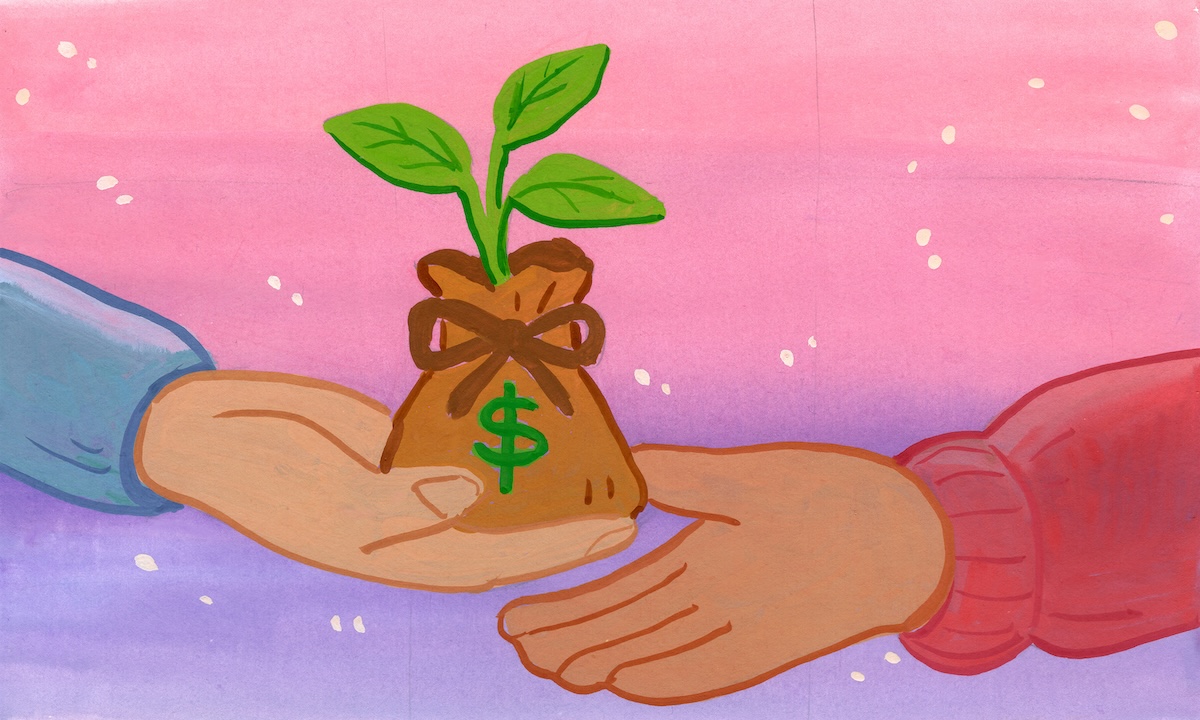Telling Better Money Stories: Ryleigh Todd-Moore Educates Around Finances in Community
“I really love being able to help youth gain more knowledge about money, because money is so important. It's everywhere around us,” beams Ryleigh Todd-Moore. Their spirit name is Red Buffalo. They were born and raised in Winnipeg, Manitoba and their family roots are from Norway House Cree Nation in Northern Manitoba. They have delivered two Connected North sessions to teach students about money so far. They love giving advice about budgeting, saving money and credit.
Professionally, they work at SEED Winnipeg, a nonprofit. They provide support in access to benefits, identification, and money management training. Their mom used to work with them and they always wanted to work there. They got in through the junior facilitator program, a summer program for Indigenous youth and they were kept on from there.
As far as education goes, Todd-Moore is starting school at the University of Winnipeg, studying anthropology full-time. They took classes part-time previously but this is their first attempt at full-time post-secondary studies.
When it comes to obstacles, Todd-Moore finds there is a lot of stress given there are funding cuts, pressure to make up funding gaps and stress around money within the non-profit where they work. There’s also a need to prioritize who gets helped and a desire to help Northern communities while also helping locally. Todd-Moore is the administrative and program assistant trainee who works with the Money Stories program and helps people coming through the front door get the information they need.
For Indigenous students going to post-secondary, their advice for managing a budget is to make a plan. “Having a plan is so important and even if it doesn't work out and you plan it perfectly, that's totally okay. Sometimes plans don't work the way we want to. Life can happen…Try again, try to revise, see where maybe you need to tweak some things. And then just don't give up,” they advise. They see this as particularly important transitioning from a small community to a city. Having people you know can be helpful but the transition can be hard, they acknowledge.
Building credit is something that starts with a credit card, Todd-Moore recommends, suggesting to do one's research. Understanding interest rates, what’s required to sign up for a credit card, utilization rates, grace periods for interest are all concepts that are important to understand.
In stressful financial situations, Todd-Moore suggests talking to someone for financial coaching, going to the bank, making payment plans, and speaking to financial advisors. “There's a lot of options, but just even taking that first step can be really stressful, but you got this,” they encourage.

When it comes to inspiration, Todd-Moore looks to their community and to Indigenous youth. “I want to make sure that every person, especially people who are Indigenous, have the access to getting that financial knowledge, because it's so important. Money is still a new topic to us. Money hasn't been around on Turtle Island for very long. We've had different forms of money, but financial currency is still new to us,” they muse aloud.
“Even just allowing them and having them be more financially independent and financially knowledgeable is so important to me, because what if there's a day that our youth are able to like, change those patterns of living in poverty, and be able to achieve their dreams with money,” they continue.
If they could share a message with their younger self it would be, “Do not stress.” Growing up, they were always stressed about growing up and about money. Money was scarce when they were growing up and now they still struggle with trying to see how much they can get for their funds. Trying to create a healthy relationship with money is something they are working on.
Thinking of their area of study for school, anthropology, they spoke about why they chose that area, saying, “I've always loved working with people, and I've loved learning about how cultures develop, how societies develop, and I just loved people watching growing up.” They hope to answer questions around why people do what they do and look at different cultures.
Looking into the future, Todd-Moore hopes to become a midwife and work with northern communities. They are a trained doula already and they would love to be able to bring positive medical care to communities so people could give birth without having to leave to go to the city. Being able to bring both skillsets would be helpful.
Their advice for students who just graduated but don’t know what to do would be to explore online using resources like the University of Manitoba website’s compass navigator. They also suggest taking a gap year to figure out what you want to do, even if it turns into two or three years. “There's no rush at all. You still have so much life, and you're only young once,” they reassure.
In closing, Todd-Moore says, “You guys are doing amazing, even if you don't feel like you are right now. All of you have your own unique gifts. Don't let anyone tell you otherwise, you guys are all amazing. Love all of you, and I hope that you all achieve the goals that you want to.”
With money being so important and all around us, Ryleigh Todd-Moore is excited to counsel youth with good financial advice. Already a trained doula, they aspire to become a midwife to help keep childbirth in communities and they are investing in their education to reach for their goals. Following in their mom’s footsteps in working at SEED Winnipeg, they found a supportive workplace that allows them to do work they are passionate about every day.
Thanks to Alison Tedford Seaweed for authoring this article.
Future Pathways Fireside Chats are a project of TakingITGlobal's Connected North Program.
Funding is generously provided by the RBC Foundation in support of RBC Future Launch, and the Government of Canada's Supports for Student Learning program.